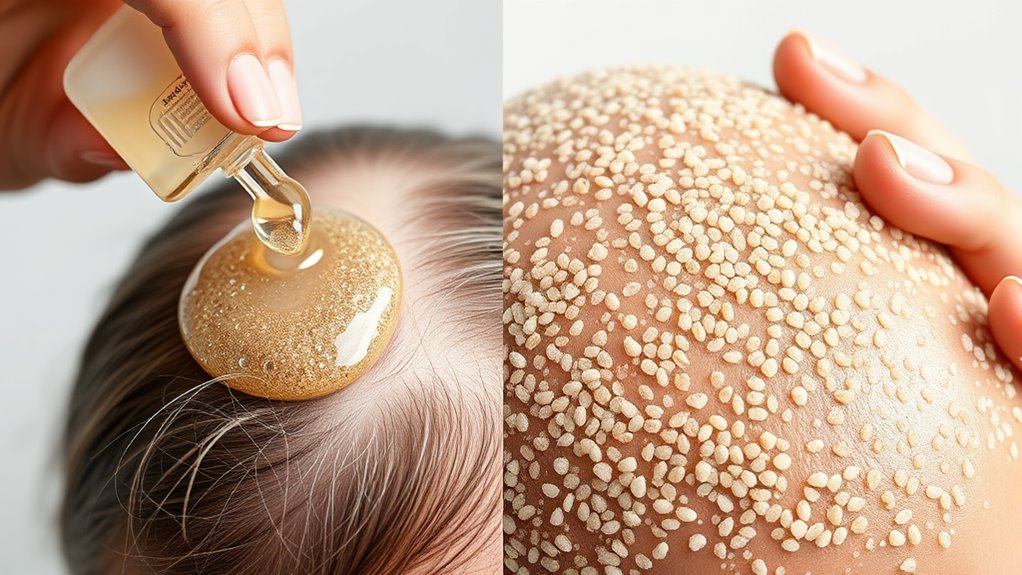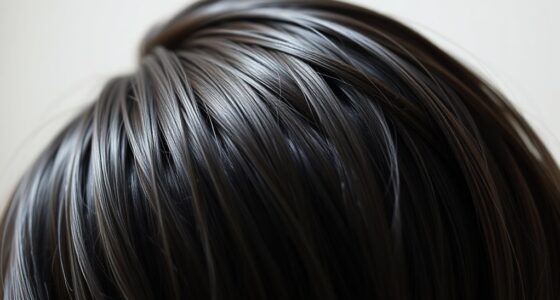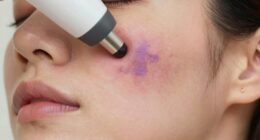Chemical and physical scalp exfoliation both remove buildup and promote healthier hair growth, but they work differently. Chemical exfoliants use ingredients like salicylic or glycolic acid to dissolve dead skin and excess oil gently, making them a good choice if you have sensitive skin. Physical exfoliants use abrasive particles or brushes for manual removal, giving immediate results. Understanding your scalp type helps you choose the best approach—learn more to find what suits you best.
Key Takeaways
- Chemical exfoliants dissolve dead skin cells using acids or enzymes, ideal for sensitive skin and gentle, deep cleansing.
- Physical exfoliants manually remove buildup with abrasive particles or brushes, offering immediate results and stimulating scalp circulation.
- Chemical exfoliation minimizes irritation risk and is suitable for those with scalp conditions like eczema or psoriasis.
- Physical exfoliation provides tactile, instant cleansing but requires gentle use to avoid scalp damage.
- Both methods improve scalp health over time; choosing depends on skin sensitivity, preference, and proper application techniques.

If you’re dealing with scalp buildup, dandruff, or excess oil, exfoliating your scalp can be a game-changer. Proper scalp care is essential for maintaining scalp health, and exfoliation offers numerous benefits that can improve your hair’s overall condition. When you remove dead skin cells, excess sebum, and product residue, you’re helping to prevent clogged follicles and promote a cleaner, healthier scalp environment. This, in turn, can lead to better hair growth, less irritation, and a reduction in dandruff. The exfoliation benefits aren’t just about aesthetic improvements; they support the foundation of healthy hair by ensuring your scalp isn’t weighed down or blocked by debris.
There are two main approaches to scalp exfoliation: chemical and physical. Each has its unique advantages and considerations, and your choice depends on your scalp’s specific needs and sensitivities. Chemical exfoliants usually contain ingredients like salicylic acid, glycolic acid, or enzymes that gently dissolve dead skin cells and excess oil without the need for scrubbing. These formulations are often preferred if you have sensitive skin or conditions like eczema or psoriasis, as they tend to be gentler and more uniform in action. Chemical exfoliation can penetrate deep into the pores, clearing out blockages that contribute to scalp issues. They also tend to be easier to incorporate into your routine, as they don’t require manual scrubbing, reducing the risk of irritation or damage. Incorporating advanced robotics in logistics, such as Amazon’s robotics expansion, demonstrates how automation can streamline processes and improve efficiency—similar principles can apply to personal care routines to optimize scalp health.
Physical exfoliants, on the other hand, involve using products with small, abrasive particles or brushes to manually slough off dead skin. If you like a more hands-on approach and prefer to see immediate results, physical exfoliation might appeal to you. When used correctly, it can effectively remove buildup and stimulate blood flow to the scalp, boosting overall scalp health. However, you need to be cautious—aggressive scrubbing or harsh particles can irritate your scalp or cause micro-tears, especially if your skin is sensitive or already inflamed. It’s important to choose gentle physical exfoliants and avoid excessive scrubbing to prevent damaging your scalp or disrupting its natural barrier.
Ultimately, both chemical and physical methods can be beneficial, but understanding your scalp’s specific needs is key. If you have sensitive or reactive skin, chemical exfoliants are generally safer and more comfortable. For those seeking a more tactile experience and immediate cleansing, physical exfoliants can be effective if used with care. Whichever method you choose, consistent exfoliation—done thoughtfully—can profoundly enhance your scalp health and reveal the full exfoliation benefits, leading to healthier, more resilient hair over time.
Frequently Asked Questions
Can Scalp Exfoliation Improve Hair Growth?
Yes, scalp exfoliation can improve hair growth by boosting scalp health and increasing hair density. When you regularly remove dead skin and buildup, it helps unblock hair follicles, allowing nutrients to reach the scalp more effectively. This process stimulates circulation, promoting healthier hair growth. Using gentle chemical or physical exfoliation methods guarantees your scalp remains clean and balanced, supporting stronger, thicker hair over time.
How Often Should I Exfoliate My Scalp?
Back in the days of powdered wigs, you’d want to be gentle with your scalp. Generally, you should exfoliate once a week to maintain a healthy scalp pH and prevent buildup. Overdoing it can disrupt your scalp’s natural balance, so adjust based on your scalp’s response. Listen to your scalp; if it feels irritated or dry, cut back. Consistency is key for effective exfoliation frequency.
Are There Any Risks With Chemical Scalp Exfoliants?
Yes, there are risks with chemical scalp exfoliants. You might experience chemical irritation, which causes redness, itching, or burning. Allergic reactions are also possible if you’re sensitive to certain ingredients, leading to swelling or rash. To minimize these risks, always do a patch test before full use and follow the instructions carefully. If you notice any adverse effects, stop using it and consult a dermatologist.
Can Scalp Exfoliation Help With Dandruff?
Yes, scalp exfoliation can help with dandruff by removing dead skin buildup and unclogging hair follicles. However, if you have scalp sensitivity, you should proceed carefully to avoid irritation. Make sure the exfoliant is compatible with your scalp type and use it as directed. Regular exfoliation can improve scalp health, reduce flakes, and promote a cleaner, healthier environment for hair growth.
What Ingredients Should I Look for in Exfoliating Products?
Look for ingredients like salicylic acid, which helps clear dead skin, or natural exfoliants such as sugar or oatmeal that gently slough off buildup. Avoid ingredients to avoid, like harsh sulfates or artificial fragrances, which can irritate your scalp. Opt for products with calming, nourishing ingredients to keep your scalp healthy and balanced. Always patch-test new products to prevent reactions and confirm they’re suitable for your skin type.
Conclusion
Now that you understand the differences between chemical and physical scalp exfoliation, the choice isn’t entirely clear-cut. Each method offers unique benefits—and potential pitfalls. But what if the secret to truly revitalizing your scalp lies in a unexpected combination? The answer could change how you approach hair health forever. Stay curious, stay attentive—your scalp’s ultimate transformation might just be one exfoliation away, waiting to reveal a new level of confidence you’ve yet to imagine.








